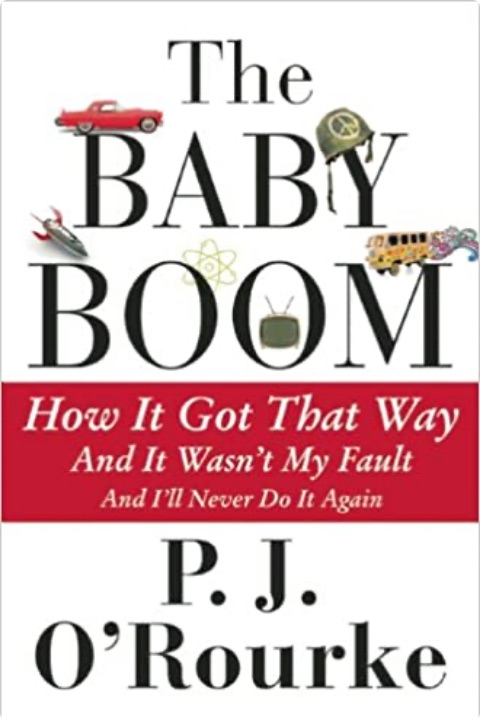Since the passing of Auberon Waugh, there haven’t been many really successful right-wing comedians. The Mayor of London is one. Another is the American journalist and wit P.J. O’Rourke.
The alliterative title of The Baby Boom, his 20th book, essentially sums up its author’s style, his childlike boisterousness, his resonant infantilism. Its scarcely less suitable subtitle — ‘How It Got That Way, And It Wasn’t My Fault, And I’ll Never Do It Again’— is almost as revealing, indicating a man engaged in a conversation with himself and determined to have the last word.
Here his professed subject matter is the generation of Americans born between 1946 and 1964: the lucky ones, in other words, who missed the horrors of the second world war but caught the high jinks of the 1960s (which as everyone knows, mainly occurred in the decade that followed). Withheld until the closing chapter, his message is that the ‘Baby Boomers’ were ‘the best generation in history — which just goes to show that history stinks’. Like Socrates’ claim to be the cleverest man alive, since he was the only one who knew he knew nothing, this is a punchline, not an argument, albeit one designed to make you think.
O’Rourke is not the go-to man for laborious analysis, but rather for riffs on a theme, switchback sentences and synonyms in rockfall. The Baby Boomer’s great gift to the world, he pronounces early, is ‘the blather, the jabber, the prattle, the natter, the gab, gas, yak, yap, baloney, blarney, bunkum, the jaw- slinging, tongue-wagging, gum-beating chin music’. Might Mr O’Rourke, just possibly, be writing about himself? And it’s at this moment — as one realises that The Baby Boom is actually a work of autobiography, as opposed to a serious socio-cultural study — that the book becomes purely enjoyable.
Like all the best memoirs, it stirs suppressed memories in the reader. It’s a while since I pondered the heart-pounding delights of Kick the Can, as O’Rourke does here, or recalled the unspeakable disappointments of attempting to make a bow and arrow out of a stick and a piece of string. ‘People are liars about their childhoods, a trait they pick up from themselves as children,’ notes the author, who dawdles always on the edge of quotability. Yet his book is wonderfully honest, admitting great events that he failed to attend (such as Woodstock) and mysteries he barely understands (such as women).
He’s also magnificently self-deprecating for someone who has a lot to boast about (including contributing to launching the career of John Belushi, writing three New York Times bestsellers, and acquiring the ability to look kind of swish while wearing braces). The single exception to this is a terrific anecdote in which he describes how, at an interview for a university fellowship, he was asked which literary critic had most influenced him. O’Rourke’s mind, clenched in a hangover, went blank as he struggled to remember the name of a single literary critic. At last he answered, ‘Thoreau’. ‘But,’ the interviewer protested, ‘Thoreau wasn’t a literary critic.’ ‘What do you mean?’, O’Rourke replied. ‘His whole life was an act of literary criticism!’ ‘I got the fellowship,’ he concludes, with a definite scintilla of smugness.
‘You can’t make a joke out of everything,’ he declares soon afterwards. ‘But you can keep trying.’ This rings particularly true from a man who once drove hundreds of miles to a place called Hell in Michigan, precisely so that, on his return, he could tell people he had ‘been to Hell and back’. Relentlessness, though, is no hindrance to humour (as Auberon Waugh, for example, understood) and nor is predictability. On the contrary. When you know that someone’s about to make a joke, and you know what kind of joke it’s going to be, you start laughing before he has even opened his mouth.
These qualities themselves make a political statement, although not one that should necessarily be classed as right-wing. O’Rourke likes to refer to his country’s two main parties as the Silly Party and the Stupid Party. This reluctance to affiliate leaves him open to the charge of not really knowing what he wants to write, beyond the fact that no one in politics, or indeed anywhere else, should command automatic respect. But this is itself worth writing, as long as he writes it well. And he really does. This man writes like a dream, as my first girlfriend once remarked, holding up a copy of Proust in translation.

